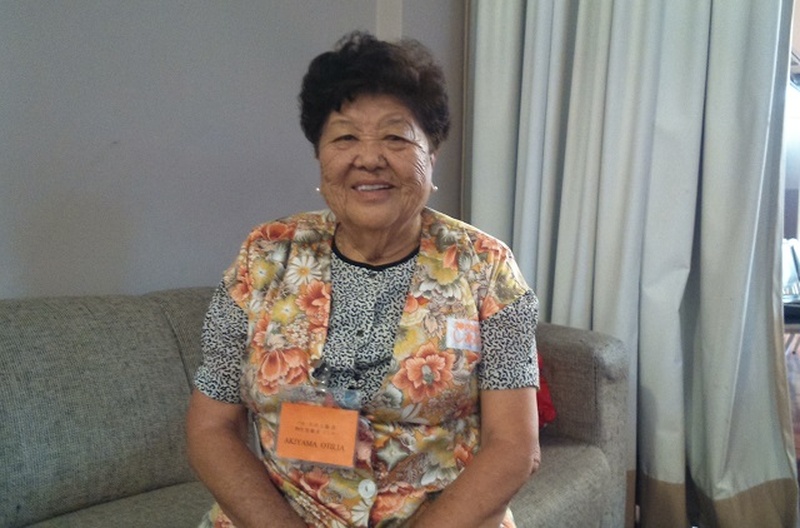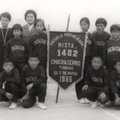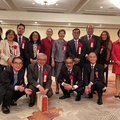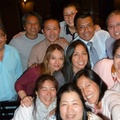Often, talking to older people about their lives involves going into the past, taking refuge in a space that seems to be their habitat. As if everything worth biographing, all the exciting things, had happened in his childhood and youth (and perhaps in middle age), the present is minimized in his stories. As if they had already lived everything they had to live and old age only consisted of existing.
You talk to them about how Messi is reinventing himself, how he is getting lower and lower to generate play and give superb assists - like someone offering gifts with bows ready to be opened -, you highlight that he is becoming a total player, and they tell you that Di Stéfano already did that, that he was capable of removing a ball in his area and in the next play reach the rival bastion to score a goal. Nothing new illuminates the sun. Everything seems to have been seen, to be written. The best is over. What has been said, the past.
When I go to interview Otilia Akiyama, an 89-year-old Nisei, I imagine an interview about her past, her childhood, her studies at Chancay Nikko (a school north of Lima founded by Japanese immigrants to educate their children), her memories of World War II.
However, all my prejudices crumble because I do not find a person trapped by memories from sixty or seventy years ago, but a vital woman who is so busy enjoying the present that she has no time to miss the past. I could use the word obaachan to refer to her, but it doesn't suit her, if she seems to have more life than me.
Doña Otilia (her friends call her Oti) is a volunteer at the Ryoichi Jinnai Recreation Center, a department created by the Peruvian Japanese Association in 1992 to serve the elderly of the Nikkei community. The Jinnai Center offers them workshops and courses, as well as recreational activities (dancing, singing, etc.).
Saying dance and song is almost like mentioning Oti san. If you ask him how a person gets to his age so full of life, he answers: “You know what? I like to dance".
If she attends a birthday gathering and people are sitting, more focused on eating than celebrating, she asks for music and starts dancing. Others are embarrassed to be the first to step into the ring, but not her. Play music and the world starts to spin.
He also dances at the Jinnai Center. And he makes the obaachan he serves dance. And sing. He notices the presence of a new grandmother who does not interact with the rest, he approaches her and asks: “Why aren't you talking? You have to laugh, there you have to sing. Sing, obaachan.”
He tells the new ones that every Thursday (the days that Oti San has to go) he is going to be with them, that he is going to teach them to sing and dance. And although some cannot stand up, they follow the rhythm of the music by moving their arms or hands.
When he sees a sad obaachan, he tries to cheer her up. A candy can help a lot. “Obaachan, what do you have?” he asks one who seems subdued. “No, I don't have anything,” she responds. “Why does he have that face?” he asks.
Something is wrong with him, but he doesn't want to say what. It then occurs to Oti San to ask a friend who always brings candy to give him several. He begins to distribute them and when he gets to the saddened obaachan, she tells him that if he eats it he will have strength, he will get genki, he will dance. Works. Spirits improve. Word begins to spread that he has given them “vitamins.” She, dying of laughter, explains that they are just candy, that she gave them to make them feel better, especially the grieving obaachan. “He had his sad face, I had to fix it,” he says.
“I like it when they are happy, I do something for them and they thank me. They tell me 'I have to pay you', 'no, what to pay, no, your grace, your smile, enough. You yorokonde, I'm happy too, don't tell me so much arigato because I know you're happy.'”
Sometimes he jokes with them to make them smile. To another who also seems sad he asks: “Obaachan, what is wrong?” "No, nothing". “ Atama ga itai? ”. "No". “I know, obaachan, you don't have a husband, that's why you are sad.” “She starts laughing, I make her laugh, I like it,” he says.
“I love the atmosphere, I come here happy. “I like talking to the obaachan, I have fun here, I keep laughing.” Grandmas also entertain themselves, so much so that for some, going only on Thursdays feels like very little.
In the year in which the Jinnai Center celebrates its silver anniversary, Oti san highlights that it is a place where people can have fun, have a good time ("I tell obaachan that here ' honto ni tanoshimi' "), instead of being in their homes sad, alone, without having anyone to talk to.
“I'm grateful Jinnai came out,” he says.
A LITTLE BIT FROM THE PAST
Doña Otilia's fondest childhood memories are playing games with her friends, such as jumping rope. She also remembers that she left the Esquivel hacienda, where she lived, every morning at 7 a.m. to walk two kilometers to school accompanied by a friend.
I only had one Peruvian teacher (he taught Spanish). The rest were Japanese. The education provided followed the Japanese curriculum. He studied seven years in Chancay Nikko. He couldn't take it anymore because the war came.
His father hid on a friend's farm to avoid being detained and deported to the United States. However, at night, under the cover of darkness, he allowed himself to temporarily return home and see his wife and children. Although the father had to take refuge, the family bakery was able to continue operating.
Oti san says that she never allowed herself to be dominated because she is of Japanese origin. As soon as they said something to her (an insult, a derogatory allusion), she responded defiantly (“what's wrong with you?”, “you're envious of us Japanese”) and nipped the matter in the bud.
She has dedicated almost her entire life to sewing. She remembers that she had to convince her father to allow her to study for a year in Lima, a key stage in her life because as a seamstress she has been able to earn her bread and contribute to the family economy. Until now she sews, a skill that one of her daughters has inherited.
Oti San could have made her life in the province of Cañete, where her husband was born and they had a business, but her eldest daughter's determination to study at a school in Lima pushed the Akiyamas—father, mother and five children—to move. to the capital, where they put down roots.
YOUR OTHER PASSION
The enthusiasm with which Oti san talks about the Jinnai Center does not suffer one bit when the conversation takes another turn and leads to gateball. “I love it,” he says.
Thanks to gateball he has been able to travel and see places like Hawaii and Okinawa (“the umi of Okinawa is very beautiful,” he says with admiration a couple of times). He enjoys traveling, going out, opening himself to new experiences. “If you tell me now 'let's go to such and such a place', I'll go. My son tells me 'mom, you don't get tired, do you?' “I don't get tired,” he laughs.
Train gateball on Sundays at AELU (La Unión Stadium Association). However, now her Sundays in this intense Lima summer are dedicated to the beach, where she goes with her son, relatives and friends, with onigiri that she prepares herself: umeboshi , miso or alone ("the one who wants me to add furikake " ).
“I live happily in my house because my son makes me proud. “It takes me everywhere,” he says.
Thursdays at Jinnai, Sundays at the beach or at AELU... Tuesdays are also busy, reserved for learning the castanet and Hawaiian dance. There is no shortage of incentives in his life, just shy of nine decades of age.
“On Valentine's Day I turned 89,” he emphasizes, as if to point out that it is no coincidence that his birthday coincides with the day of love and friendship, of the celebration of affections. An entire declaration of principles.
© 2017 Enrique Higa






